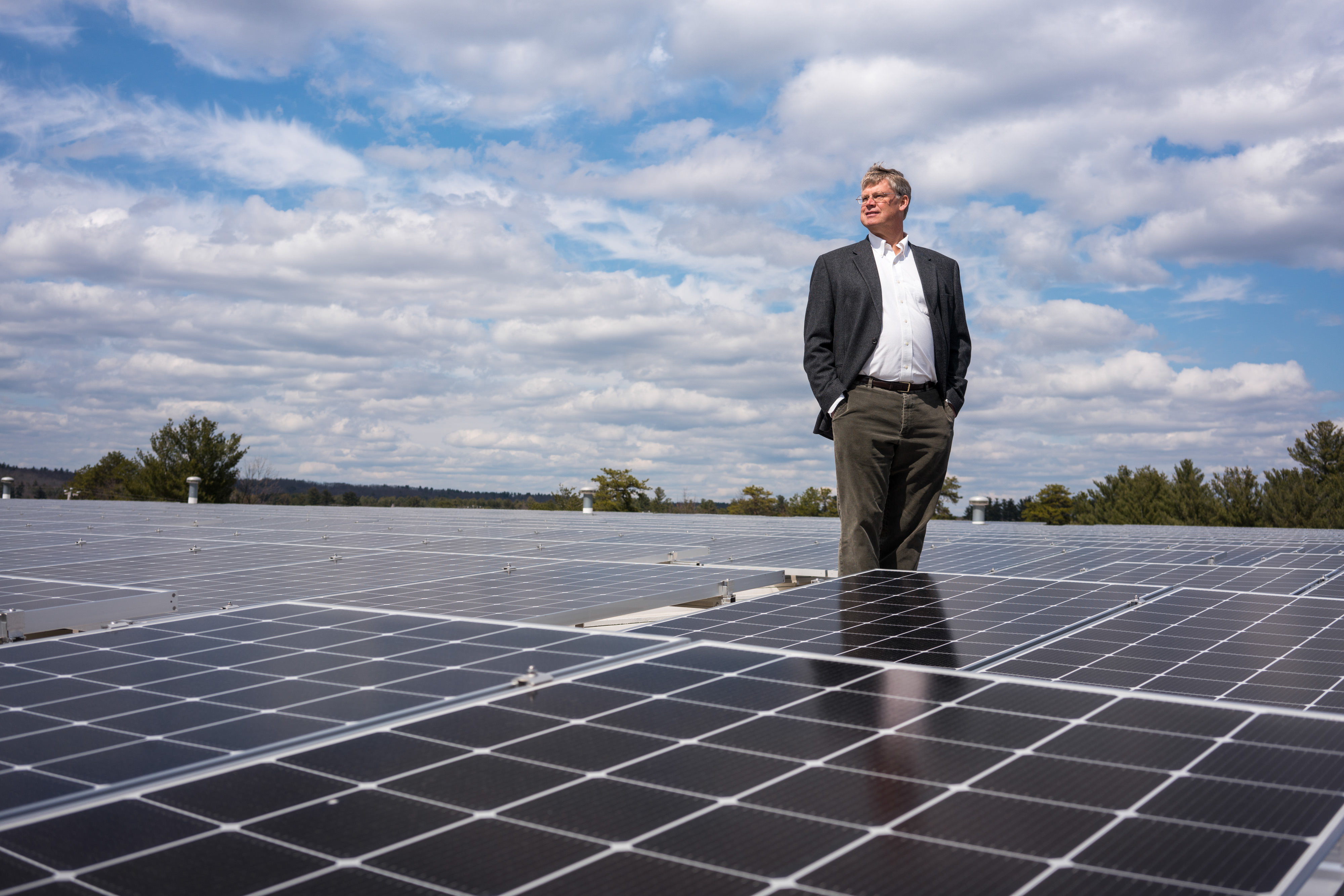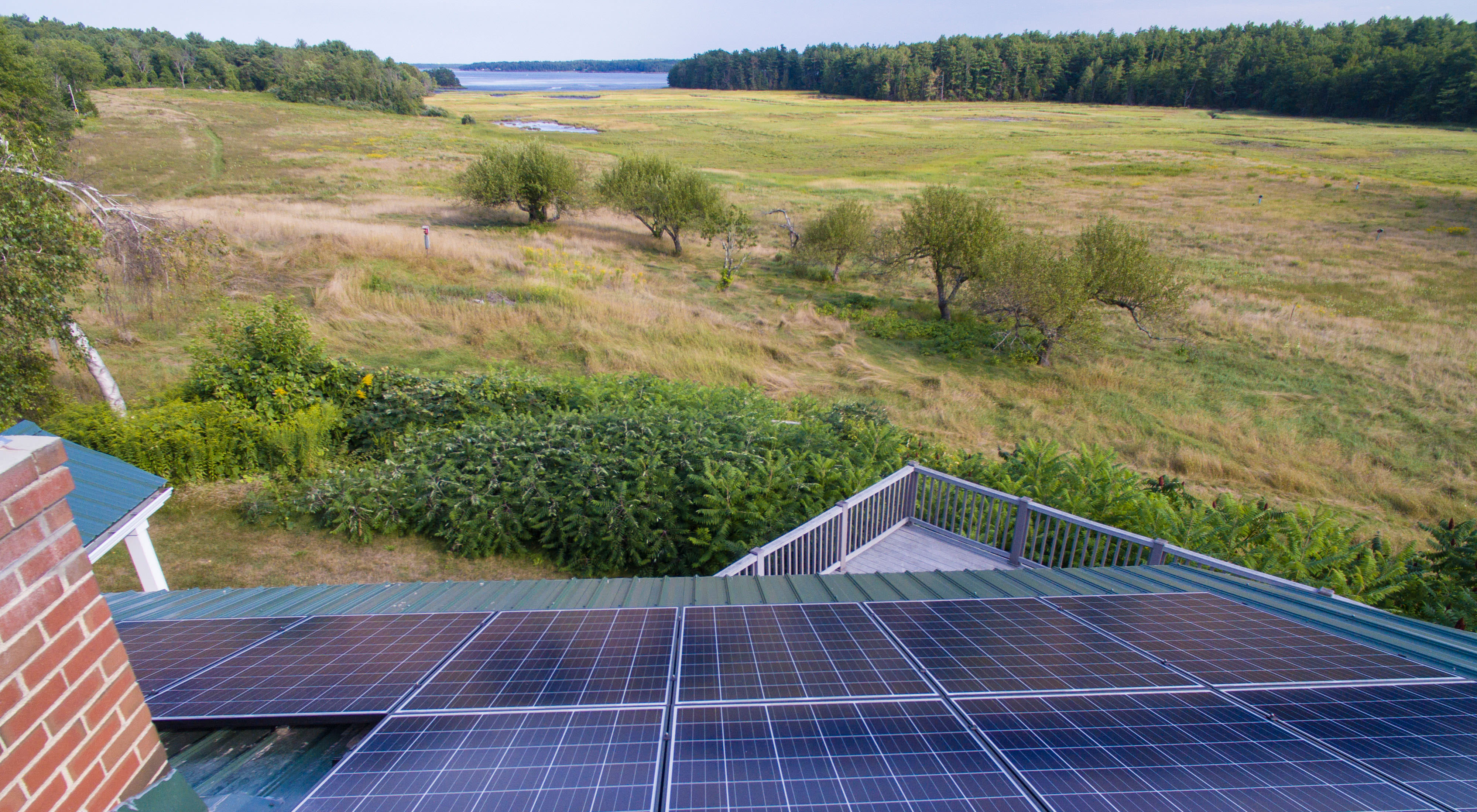Sparking New Hampshire's Clean Energy Future
Tackling the climate challenge in the Granite State.
Quote: David Worthen

“The fact is, we want to be around for a while. The best way I know how to do that is to make products efficiently, use less energy and create less waste.”
David Worthen has a story to tell.
David is president of Worthen Industries, his family-owned business, which makes industrial adhesives and coatings from its headquarters in Nashua. It’s been in existence in one form or another since 1866, and David wants to make sure its future is secure.
“The fact is, we want to be around for a while,” Worthen explains. “The best way I know how to do that is to make products efficiently, use less energy and create less waste.”
For Worthen, using less energy has meant a substantial commitment to efficiency—from installing LED lighting to setting a 40-miles-per-gallon minimum for cars in the company fleet. It also means a significant investment in renewable energy. Adorning Worthen’s roof are 80,000 square feet of solar panels, a capital project that will provide nearly half of the facility’s energy needs, and is expected to pay for itself within five years.
For a growing number of New Hampshire businesses, employees and local governments, clean energy—such as renewables and energy efficiency—is becoming essential to success. Across the state, country and globe, increased investment in clean energy technology is required if we are to reduce carbon emissions and sustain our climate.

Listening and Acting
There are many stories in the Granite State like Worthen Industries’, and The Nature Conservancy wants to make sure they’re heard—especially by those who influence New Hampshire’s energy future.
This is why TNC partnered with the New Hampshire Clean Tech Council to bring elected officials together with business and municipal leaders. The goal? To discuss the economic and environmental opportunities associated with the growth of the clean energy and technology industry, and identify obstacles to seizing these opportunities. From the seven listening sessions held across the state, we heard many voices rally around a common theme: Municipalities and businesses are eager to find creative ways to lower their energy costs while lessening environmental impacts.
“New Hampshire’s businesses are ready to make the transition to clean energy,” says Kate Epsen, executive director of the New Hampshire Sustainable Energy Association. “To encourage them, we need to develop 21st century policies that enable increased investment, modernize our energy infrastructure and help develop the workforce needed to support this transition.”
Sustainably Supporting the Bottom Line
“Science tells us that we need to act now to substantially reduce our carbon emissions to avoid some of the most damaging effects of the changes to come,” says Jim O’Brien, deputy state director for TNC in New Hampshire. “To be successful, we need solutions that are good for both our environment and our economy.”
But is being more sustainable actually good for the bottom line? A recent report by The University of New Hampshire sheds some light on the economic benefits associated with clean energy. Historically, the growth in our economy was accompanied by a corresponding increase in energy consumption and harmful emissions. In New England, this is no longer the case. The UNH report reveals a new reality: “New, less energy-intensive industries, combined with more energy-efficient technologies and practices, are achieving economic growth and decreases in energy consumption.” The conclusion: Clean energy is good for our economy and environment and helps to lower the overall cost of energy.
Armed with the economic analysis provided by the UNH report, the real-world experiences and needs of the business community, and the urgency of the climate challenge, The Nature Conservancy and our partners are preparing to bring policy solutions to Concord.
Focused Solutions for the Future
The Nature Conservancy and the New Hampshire Clean Tech Council held a roundtable discussion in Nashua with Governor Chris Sununu and more than 30 business leaders and municipal officials from across the state. Hosted by Worthen Industries, the conversation focused on the need for a comprehensive state energy plan that will spur public and private investment in clean energy—aggressively reducing emissions while continuing to grow our economy.
It’s not difficult to convince businesses and individual residents about the value of clean energy, especially when they see benefits first-hand," says Bruce Clendenning, climate project manager at TNC. "Their combined voices are important for the more difficult task: convincing policy makers. If we are talking about getting policies changed, we need businesses and municipal leaders, but we also need regular people to say, ‘You know, it works for me, too.’”
“We are committed to bringing the governor a set of policy recommendations that will advance clean energy and reduce emissions—all with a positive economic impact,” concludes Jim. “We know that by working together, we can show that modern energy policies will strengthen New Hampshire’s economy, reduce our reliance on fossil fuels, and create a model for bipartisan solutions. All of us—from homeowners to the largest manufacturers—should have the opportunity to make the clean energy choices that are right for them.”
That’s why New Hampshire’s model of engaging diverse groups bound by common interests is so important, at home and around the country. “We are able to show how we can work in a state like New Hampshire, how we can bring people together, engage them on their terms, how we get people you don’t think will agree to work with you to change things,” says Bruce. “If that can be modeled across the nation, that’s huge.”
And that’s just what we’re starting to do.
Get energized yourself! Assess your own carbon footprint with our Carbon Calculator and check out the New Hampshire's Energy Future is Now YouTube channel.
